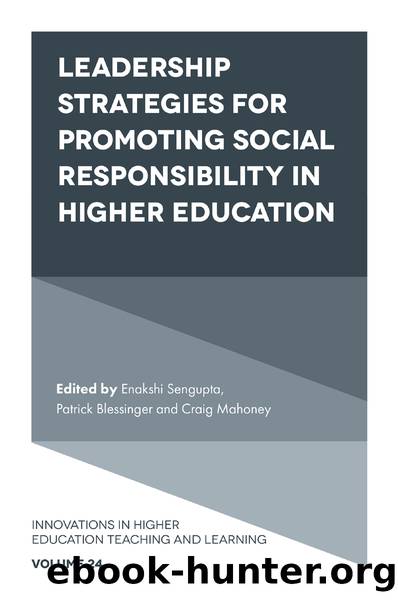Leadership Strategies for Promoting Social Responsibility in Higher Education by Sengupta Enakshi;Blessinger Patrick;Mahoney Craig;

Author:Sengupta, Enakshi;Blessinger, Patrick;Mahoney, Craig;
Language: eng
Format: epub
Publisher: Emerald Publishing Limited
Published: 2020-06-11T00:00:00+00:00
Research
The implementation of sustainability into a HEIâs research agenda is an important factor in embedding sustainability into management education. Matten and Moon (2004) highlighted that HEIs that pioneered RME have significant numbers of researchers within the field and confirm the strong role that research activities have for embedding sustainability in education. Research is one of the categories for which stakeholders of HEIs are increasingly asking HEIs to demonstrate their impacts on SD. Findler, Schönherr, Lozano, and Stacherl (2018) have argued that the assessment of impacts on SD is a complex exercise because impacts materialize along complex pathways, particularly in the area of research and education. This was recently showcased in the exercise of the Financial Times (Jack, 2019a) who asked more than 220 business schools to submit examples of ways in which they were delivering societal impact.
As sustainability is a complex topic, inter-disciplinary research projects should be engaged in providing a more holistic view on the relevant issues and offer the best quality research results possible (Godemann, Bebbington, Herzig, & Moon, 2014). Therefore, the establishment of new research centers is proposed to bridge the gap between different institutions, disciplines and businesses and to fulfill the demand in solving practical sustainability issues (Elobeid, Lele, & Kaifi, 2016).
Transdisciplinary research takes this mission a bit further by involving researchers from different disciplines and non-academic stakeholders to develop solutions accounting for norms and based on ownership and legitimacy (Lang et al., 2012). Therefore, more practice-oriented research in collaboration with businesses and other external stakeholders is needed to sound the developed strategies with the norms and goals in society to ensure an impact of the research. As a final thought to this section, actively engaging students in research activities and projects is an important aspect of their education that serves to more deeply engrain what they are learning and as such should be integrated into curricula (Kueffer et al., 2012).
Download
This site does not store any files on its server. We only index and link to content provided by other sites. Please contact the content providers to delete copyright contents if any and email us, we'll remove relevant links or contents immediately.
The Art of Coaching Workbook by Elena Aguilar(50152)
Trainspotting by Irvine Welsh(21063)
Twilight of the Idols With the Antichrist and Ecce Homo by Friedrich Nietzsche(18314)
The Secret History by Donna Tartt(18250)
All the Missing Girls by Megan Miranda(14828)
Cat's cradle by Kurt Vonnegut(14799)
Ready Player One by Cline Ernest(14055)
Talking to Strangers by Malcolm Gladwell(12909)
Fangirl by Rainbow Rowell(8811)
The Compound Effect by Darren Hardy(8536)
Thirteen Reasons Why by Jay Asher(8483)
The remains of the day by Kazuo Ishiguro(8425)
Periodization Training for Sports by Tudor Bompa(7939)
Tools of Titans by Timothy Ferriss(7841)
Wonder by R. J. Palacio(7753)
The Lover by Duras Marguerite(7603)
Change Your Questions, Change Your Life by Marilee Adams(7396)
A Court of Wings and Ruin by Sarah J. Maas(7299)
The Complete Stick Figure Physics Tutorials by Allen Sarah(7157)
